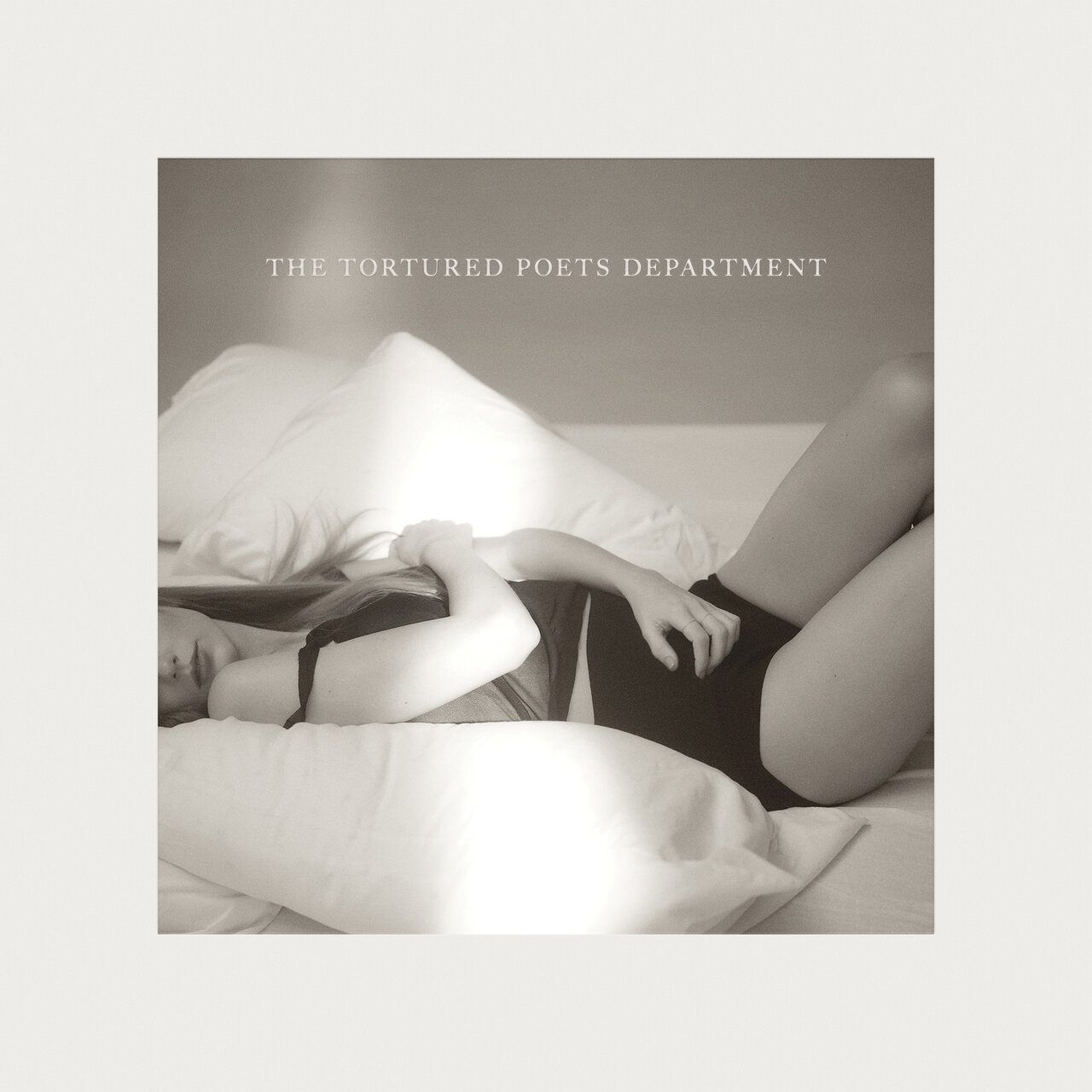Taylor Swift’s ‘The Tortured Poets Department’: Perversely Fascinating, Subtly Disastrous
Failures at this level are rare. Enjoy them when they happen.
Social scientists will likely spend years analyzing Taylor Swift’s retained meteoric success, but the primary cause seems very simple: pure narcissism. Swift’s music is almost entirely about her, from her perspective only; in both her music and her public presence, those around her (lovers, friends, enemies) are secondary to her and how she feels, their proximity or distance meant to prove something favorable about her. In the age of main character syndrome, Swift’s portrayal of herself undoubtedly attracts this parasocial connection. She’s a “simple girl” who controls her own narrative, and just like her masses of fans, makes everything about her. She acts as an eternal underdog who can do no wrong, insisting that everyone else has wronged her.
Swift’s narcissism and its resulting public obsession has transformed into its own economy, one significant enough to have legitimate impact on actual, practical economies. Fans act like her products and performances are as essential as oxygen (a $45 empty slipcase for her vinyl variants sold out immediately), while international embassies hope that ensuring her speedy private jet travel will make their antiquated institutions relevant to “the kids.” Taylor Swift already came from an upper class upbringing, but has now become something else entirely: the first billionaire musician who got there without selling sneakers or alcohol.
At this point, she could easily take a rest, but she’s cranking out more product than ever. As such, her new album The Tortured Poets Department arrives merely 18 months after 2022’s Midnights, as the latest excuse for her continual media overexposure. It’s been absolutely impossible to get a break from her; since the 2020 pandemic releases folklore and evermore (and arguably 2019’s Lover), she hasn’t gone a calendar year without at least one new album or major back catalog re-recording. Of course, that’s only scratching the surface: there’s also the Eras Tour, the Eras Tour concert video (despite a theatrical release, it seems too lazy for the distinction of concert film), her relationship drama all over tabloids and Twitter, controversy about her private jet’s carbon emissions (and the lawsuit that only makes her look worse for it), and heightened questioning about her interactions or aggressions towards other pop stars. Get off the internet, turn on the TV, and she’s still there, getting drunk at the Super Bowl with her racial diversity friend Ice Spice.
Isn’t everyone exhausted by now?
Despite the small but growing minority of fans slowly rejecting her—scroll through r/SwiftlyNeutral for more of that—Taylor Swift is the last holdover of a dying monoculture, with no one to replace her. As social media splinters the music industry (and celebrity culture at large) into smaller pockets of intense fandom, Taylor Swift’s advantage is that she already attracted unified swaths of fans before they split off into smaller consumer demographics. Therefore, nearly everyone seems to be a Taylor Swift fan, or at least listener, to some extent. Her unseen level of fame lets her live in bubble of her own creation, doing whatever she wants and forcing everyone to accept every little detail of it. But of course, people will eventually get tired, especially when the music begins to suffer.
…Which brings us to The Tortured Poets Department, an especially narcissistic record completely detached from reality. Taylor Swift is already on thin ice; most artists who debuted in the mid 2000s are naturally fading from peak relevance, and while she still has unparalleled fame, TTPD’s rollout has been precarious. At this year’s Grammys, she announced the album during an acceptance speech for Midnights, adding “music’s biggest night” to the list of “Taylor Swift’s biggest nights.” Reinforced by a terrible album title (rich people have feelings too, but no billionaire can be “tortured,” and she’s not much of a “poet”) and embarrassing song names like “But Daddy I Love Him” and “I Can Fix Him (No Really I Can),” The Tortured Poets Department is an unprecedented disaster, a grave miscalculation at a time when Swift can’t afford it. And that’s before you get into the four physical variants with different bonus tracks and the extra 15 songs tacked onto the already 65-minute digital album. Taylor fatigue has officially set in; it’s only downhill from here.
With folklore and evermore, Swift asserted, even confirmed herself as a Serious Artist worthy of close critical study; media outlets complied, if only because it provides a steady stream of agreeable content. Since then, however, Swift’s music has more than ever become a vehicle to explain her personal life. Actual musical substance now seems secondary to the relationship drama she’s always mined, which on TTPD comes to the fore. This album is painfully reliant on her personal life, almost requiring the tabloid context that her team rigorously engineers. Swift positions this as her Blood On The Tracks or Blue, not realizing that listeners don’t need to know about Dylan’s divorce or Joni Mitchell’s breakup with Graham Nash to appreciate those respective albums. Instead, Tortured Poets is word vomit over background wallpaper, lacking a centerpiece like “Idiot Wind” or anything as cutting as “Carey” or “The Last Time I Saw Richard.” If anything, Swift’s album is closer to Robin Thicke’s Paula (itself similar to Marvin Gaye’s Here, My Dear), where the R&B singer desperately tried to win back his wife, only to give her more reason to hasten the divorce.
There’s a line between critical analysis and parasocial conjecture, but The Tortured Poets Department makes it impossible to not speculate. Swift’s specificity leaves nothing in question about the lyrics’ who, what, where, or when, and it certainly sounds autobiographical. Really, it demands an autobiographical reading, because Swift comes across so unflattering when obviously writing about a particular recent relationship. This album is easily her most verbose work, spilling details as she halfheartedly emulates another, much better songwriter. In fact, this individual looms over the majority of TTPD, and if you interpret everything the way Swift wants you to, many songs are even about him.
Yes, The Tortured Poets Department is mostly about Matty Healy: genius provocateur, deserved egomaniac, insecure pseudointellectual, chronically online shitposter, friend to every Dimes Square podcast personality, magnetic frontman of The 1975, greatest songwriter of his generation… and ex-boyfriend of Taylor Swift. Healy, for all of his wordy pretentiousness, knows exactly when to build up his ego, then puncture it and cast doubt on his artistic and intellectual legitimacy. On The 1975’s five stylistically schizophrenic masterpieces, this works gloriously as he carefully observes himself and the world around him. And it is Matty Healy whose writing style Taylor Swift strives to match.
Swift and Healy had a (publicly) brief fling last year, yet rarely has Swift’s music seemed so explicitly fixated on one person. There are songs about the pre- and post-Healy relationships (a quiet, years-long relationship with actor Joe Alwyn and her current romance with football player Travis Kelce), but they’re not as passionate and obsessive as the ones about Healy. He is the “tattooed golden retriever” on the title track, the one where “the jokes that he told across the bar were revolting and far too loud” on “I Can Fix Him (No Really I Can).” The latter even has a direct allusion to The 1975’s “Roadkill:” Swift’s “the dopamine races through his brain on a six-lane Texas highway” recalls Healy’s “well I pissed myself on a Texan intersection.” The opening line of “Guilty As Sin?” is more effective than actually mentioning his name, as Swift sings, “Drowning in The Blue Nile/He sent me ‘Downtown Lights’/I hadn’t heard it in a while.” Healy is known to love The Blue Nile, and at one point brilliantly plagiarized “The Downtown Lights” for himself.
Admittedly, only the most rabid 1975 fans could notice many of these parallels. I would know, as I’ve seen the band twice and even camped out at 4:45 AM for one of their shows (and would do it again in a heartbeat). Without getting conspiratorial, the stories on Tortured Poets appear to span a decade: from Swift and Healy’s initial entanglement and subsequent dissociation during Healy’s addiction days (bonus track “Chloe or Sam or Sophia or Marcus”), to Swift’s revived infatuation after the Alwyn relationship (“Fresh Out The Slammer,” with lyrics like “Now pretty baby I’m runnin’ back home to you/Fresh out the slammer, I know who my first call will be to”), the resulting public controversy (“But Daddy I Love Him”), the unceremonious ending (“loml” or “loss of my life”), and the immediate rebound (“The Alchemy,” full of terrible football references).
And throughout many of these songs, Swift gives a sense that she harbors discreet jealousy towards Healy’s writing skills. She won’t beat him at his game—she wins in basic word count but sorely loses in ideological density—but she adopts his characteristic quotation marks and big words (with extremely unnatural lyrics like “sanctimoniously performing soliloquies I’ll never see”) and uses the minimum required amount of ego-bursting self-deprecation. Unfortunately, the title track’s refrain, “You’re not Dylan Thomas/And I’m not Patti Smith/This ain’t the Chelsea Hotel, we’re modern idiots” is the closest she can get. It’s still nowhere near Healy’s lyrics on “Part Of The Band” or “The Sound.” Swift’s line proves nothing more than the steep decline in media literacy, as multiple outlets rushed to poorly explain the Dylan Thomas/Patti Smith line. (And c’mon Taylor, why not pick two bohemian creatives who lived in the same time period, how hard is it?!) Matty Healy’s occasional clunkiness is that of someone with too many thoughts to express (check out 2016’s gloriously messy “Loving Someone”), while Swift’s clunkiness is that of drunken first drafts passed off as a final product. “At dinner you take my ring off/My middle finger and put it on the one/People put wedding rings on,” goes yet another clumsy line from TTPD’s title track.
Such lyrical obsession over a superior but less popular songwriter puts Swift in an odd position; she’s got more fame, power, and money than Matty Healy (even if he’s doing quite well for himself), but she doesn’t say anything to damage her career. In fact, I’d argue that Swift’s maniacal focus on him only makes him look even better, because rarely do we see such a prominent public figure lose their mind this much over one person. TTPD isn’t as outwardly unhinged as Kanye’s still-unfinished divorce breakdown Donda 2, though these albums are a lot closer than most people would comfortably admit.
Taylor Swift is carefully media-coached and respected by basically everyone and their great-grandmother, while Matty Healy is an outspoken, contentious figure. She plays to sold-out sports stadiums worldwide, while The 1975 plays to packed arenas overseas but half-empty venues in most of America. However, there’s an even deeper clash between the two’s respective cultural orbits. Swift barely gives interviews and gets attention with her mere presence, while Healy gives loads of interviews, often revising statements in real-time and not shying from controversy. The latter got him in trouble early last year based on a hilarious, appallingly misunderstood appearance on The Adam Friedland Show, a post-left comedy podcast of white dudes taking the piss.
Swifties, believing that they’re “helping” Taylor herself, thought that Healy was actually a perverted racist and ruthlessly attacked him. On “loml,” she accuses Healy of ghosting her, but perhaps it’s the negative attention from Swift’s fans made him run for the hills (in that case, who could blame him?). Whatever the real story, Taylor Swift stayed completely silent over Healy’s revived podcast controversy, but now claims on the country-tinged “But Daddy I Loved Him” that she refused to “cater to all these vipers dressed in empath’s clothing” and, in a flashback, asserts, “I know he’s crazy but he’s the one I want.”
Considering the rest of The Tortured Poets Department, Swift doesn’t seem to realize how actively she displays repellant character defects with zero self-criticism. If she really cared about her relationship with Healy, couldn’t she have said or done something to curb her fans’ excessive behavior, which they think is in her benefit? Even cursory observation of Healy’s music and public remarks eliminates any possibility he would assimilate to her (mainstream, basic, generally apolitical) world, but she didn’t cross over to his, either—no podcast episode with socially confused, semi-ironically racist bohemian layabouts.
This goes back to the narcissism: if Swift wants Tortured Poets to so strongly rely on her publicly displayed personal life, the contradictions between her lyrical portrayal of this relationship (romantic, yearning, maybe entrancingly destructive) and her public behavior while it actually happened (letting him be villianized for weeks) make her seem completely deranged. The hyperfixation on the relationship or person isn’t the problem. Rather, it’s her fundamental inability to understand the compromises of healthy human interaction, all while she still paints herself as the victim in her own mess. If she wants listeners’ sympathy, she has to take responsibility for her role in these stories, because there’s no way that only the other side is wrong. There’s a difference between establishing one’s agency and pure blame shifting; Swift indulges in the latter but passes it off as the former, and it makes her look bad. And to her fans, she looks even crazier for writing so much about a man they viciously dislike.
Not that there’s anyone to tell her that, of course. Taylor Swift has cultivated an environment similar to Christianity, except it’s more like everyone worshipping Jesus and treating him like their everyday bestie. Fans have no shame cutting off their friends whose opinions on Swift don’t align, like this Swiftie quoted in The Cut: “[My friend] couldn’t fathom the impact Taylor Swift has on my life, and I couldn’t ignore her lack of understanding and support. Taylor Swift has remained a constant source of comfort and understanding, while my friend has become a distant memory.” Swift fills her social and professional circles with blind disciples like Jack Antonoff, who says that questioning her songwriting “is like challenging someone’s faith in God. You just don’t go there.” Taylor Nation, a fan outreach branch of her management and PR team, boasted about the recent streaming accomplishments of “Shakespeare herself.”
Marketing hype and outright delusion might as well be the same thing now, because even the Shakespeare-ambivalent would be offended by that comparison. Most of The Tortured Poets Department’s lyrics are pure garbage. There’s the title track’s “You smoked then ate seven bars of chocolate/We declared Charlie Puth should be a bigger artist.” How stoned would you have to be to think that the guy who sang, “Let’s Marvin Gaye and get it on” should be more relevant? There’s the absurd, poorly articulated part of bonus track “I Hate It Here:” “My friends/Used to play a game where/We would pick a decade/We wish we could live in/Instead of this/I’d say the 1830s/But without all the racists/And getting married off for the highest bid.” Weren’t those the defining characteristics of the 1830s? Then what’s the desirable part? Other lyrics sound as if written in a middle school poetry elective, like “I would’ve died for your sins/Instead I just died inside/And you deserve prison/But you won’t get time” (“The Smallest Man Who Ever Lived”). Or “You know how to ball/I know Aristotle” (bonus track “So High School,” which compared to the rest of the project is a heavenly breath of fresh air). And some lines are just dull, and don’t sound convincing coming from Taylor Swift. “Now I’m down bad crying at the gym” (“Down Bad”), says the woman who recently locked everyone outside of a gym and must have a miserable life when she steps into the steam room at Equinox.
Not everything is awful, but Tortured Poets is still the most insignificant Taylor Swift record in a three-year string of them. Past the first two songs and some of the bonus tracks, there’s a dearth of memorable melodies or actual hooks; everything blends into 65 minutes of predictable, homogenous mush. Relative to this, the rote and redundant Midnights sounds fresh and innovative—at least that record had “Karma” and “Vigilante Shit.” TTPD’s sonic palette, courtesy of returning producers Jack Antonoff and The National's Aaron Dessner, blends folklore and evermore’s organic instrumentation with Midnights’ muted electronics, but still becomes wallpaper. The more suffocating of Antonoff’s contributions sound as if he made them whilst asleep using a DAW template left over from Lorde’s “Supercut,” while the better moments sound like C-tier Lana Del Rey scraps. Dessner’s productions are less consistently insufferable, but nonetheless quickly get boring.
There are a few songs that aren’t so mind-numbingly static, but even those have jarring transitions (“Florida!!!”) or glacial buildups with no emotional impact (“Who’s Afraid Of Little Old Me?”). “I Can Do It With A Broken Heart,” the core album’s only upbeat synthpop track, randomly lapses into a chorus that sounds like a Carly Rae Jepsen song. Actual featured artists—Post Malone on opener and lead single “Fortnight” and Florence Welch on “Florida!!!”—barely provide any meaningful textural contrast (though Welch succeeds a bit better). Overall, there’s no musicality, just backgrounds for Swift’s rambling. Knowing that it’d be equally effective as an audiobook adds to The Tortured Poets Department’s failure as an album of music. (The digital “bonus disc,” known as The Anthology, isn’t as glaringly bad as the proper album, but it’s awfully boring. By the time you get halfway through it, you’re already burnt out.)
The Tortured Poets Department will inevitably sell millions of copies, but that doesn’t matter; Taylor Swift could release her own Metal Machine Music with overdubbed farts and it’d still go multiplatinum. In the long run, however, this will tremendously backfire on her. The last thing the world needed this soon was more new Taylor Swift music, and regardless of the mass-media outlets who’ve given it glowing reviews, it already looks like a Be Here Now-type situation where critics are terrified of looking out of touch. But it’s Swift who’s miserably out of touch, and once the mass delusion of her excellence cracks a bit more—likely in a couple months from now, when everyone realizes how bland and tediously bloated Tortured Poets is—her reputation will crash like never before. Don’t be surprised if she never again reaches her 2023 heights. More than anything else, this album clarifies that what she needs right now isn’t a new relationship with a football player. Instead, she might do better with therapy, rehab, and SLAA meetings.
The Vinyl Edition
As expected, The Tortured Poets Department comes with four main vinyl variants, each with their own artwork, vinyl colors, and different bonus tracks (the CD variants use the same strategy). The idea is that everyone spends nearly $200 to get all the extra songs, except the full bonus disc will eventually get its own vinyl release at some point or another. It’s easy money for work that’s already done.
Randy Merrill mastered the digital releases at Sterling Sound in Edgewater, NJ, while Ryan Smith at Sterling’s Nashville facility mastered the vinyl edition (some variants cut solely by him, others cut in collaboration with Joe Nino-Hernes). Pressing duties were split between Optimal in Germany and Vantiva in Mexico. I got the standard weight “ghosted” white vinyl (standard cover, with “The Manuscript” as the bonus track) pressed at Optimal. The pressing has some very minor surface noise, though both discs were reasonably flat and centered.
Despite a printed vinyl mastering credit and how it implies a separately prepared vinyl master, the LP still sounds compressed. That’s clearly a result of mixing engineer Serban Ghenea drenching the individual mix elements with tons of compression, as well as his method of delivering his mixes with a limiter already printed on. Therefore, the album can only sound so dynamic, though Merrill’s 48kHz/24bit digital master is far from slammed and Ghenea’s mix sounds good for what it is. Still, the vinyl sounds more claustrophobic than the digital master, rendering the production more congealed as Swift’s vocals are noticeably pushed forward.
While it doesn’t sound like a $40-50 record should, the packaging is indeed very nice. All variants have printed inner sleeves and a direct-to-board gatefold jacket with a full-size 24-page booklet glued in. The booklet weighs down the jacket structure (a tip-on jacket would hold up better), but it still feels luxurious to flip through. In addition to lyrics and photos, there’s an “introductory poem” by Stevie Nicks. It’s either a simple case of women supporting other women, or just another microaggression towards Matty Healy. Regardless, Taylor Swift will never write anything nearly as great as “Silver Springs.”
And of course, we can’t overlook Swift’s own “summary poem” at the end of the booklet. An excerpt:
“And so I was out of the oven
And into the microwave
Out of the slammer and into a tidal wave
How gallant to save the empress
from her gilded tower
Swinging a sword he could barely lift
But loneliness struck at that fateful hour
Low hanging fruit on his wine stained lips
He never even scratched the surface
of me.”
Ladies and gentlemen, the “tortured poetry” of “Shakespeare herself!” Good fucking grief, I want my money back. Time to wear my The 1975 t-shirt and listen to “The Downtown Lights” about 300 times to clear out the stink of this record… because at the end of the day, The Tortured Poets Department is one of the most exhausting records I’ve ever listened to.












































